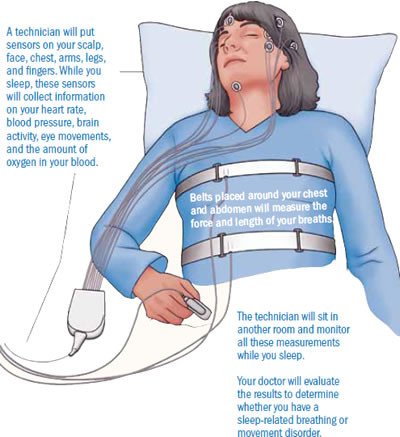Sleep apnea
Medically reviewed by Drugs.com. Last updated on Jun 24, 2023.
What is Sleep apnea?

Sleep apnea is a disorder that causes people to stop breathing for short periods during sleep. These periods are called apneas. Apneas usually last between 10 and 30 seconds. In severe cases, apneas can happen many hundreds of times each night. People with untreated sleep apnea are more likely to develop high blood pressure.
Apneas disrupt a person's ability to get a good night's sleep, making them less alert during the day. This can lead to accidents. People with untreated sleep apnea are up to seven times more likely to be involved in motor vehicle accidents.
There are two types of sleep apnea:
- Obstructive sleep apnea occurs when the airway in your nose or throat becomes partially or completely blocked. It can be blocked by large tonsils, a large tongue, or by too much tissue in the airway. Excess tissue in the airway is more common in people who are overweight. When airway muscles relax during sleep, this extra tissue can block the breathing passages.
- Central sleep apnea occurs when the brain stem, the area of the brain that controls breathing, is damaged. The brain stem may be damaged by an infection or stroke.
Symptoms
Symptoms of obstructive sleep apnea include excessive sleepiness during waking hours. Loud snoring is another symptom, and the person's bed partner may be the first to notice this problem. Morning headache and dry mouth can occur. Obesity is common, though not all people with sleep apnea are overweight.
Diagnosis
If your doctor suspects sleep apnea, he or she is likely to do the following during your visit:
- Ask whether you snore and/or feel excessively sleepy during the day.
- Perform a physical examination. Your doctor will look for any narrowing inside your mouth and throat.
- Check the size of your neck. The larger your neck, the more likely you are to develop obstructive sleep apnea.
- Check your blood pressure. People with sleep apnea are more likely to develop high blood pressure.
A sleep study is needed to confirm the diagnosis. Sleep studies traditionally have been performed overnight, at a sleep center. However, today home sleep studies are often sufficient to make the diagnosis.
During a formal study done at a sleep center, sensors are placed on your finger, scalp, and chest. The sensors on your scalp detect brain waves to measure how long it takes you to fall asleep, how long it takes you to enter different stages of sleep, and how often you wake up during the night. The monitor on your finger measures the oxygen level in your blood. Monitors on your chest record your heart rate and breathing, as well as how often you stop breathing. A monitor is also placed just inside your nostrils to measure air flow.

Illustration: Alayna Paquette
Home sleep studies are not as complete as studies done in sleep centers. The home equipment can measure blood oxygen levels, chest movement, and nasal airflow. Some also track head movement and heart rate and record snoring levels.
Expected duration
How long sleep apnea lasts depends on its cause and on the effectiveness of treatment. Generally, sleep apnea is a chronic disorder. This means you'll be dealing with it for a lifetime. For people with central sleep apnea, how long the problem lasts depends on treatment for the underlying neurological or cardiovascular disorders.
Prevention
You can help to prevent obstructive sleep apnea by maintaining a healthy weight.
To reduce sleep apnea symptoms, avoid alcohol and sedatives.
Treatment
To treat obstructive sleep apnea, many people sleep with a continuous positive airway pressure (CPAP) device. A CPAP device is a mask that fits over your mouth and nose. It forces your airways open with a stream of air. This allows you to breathe more easily.
When we fall asleep, all of our muscles relax, including the muscles that hold our jaw forward. Some people with obstructive sleep apnea partially close their airway when the jaw moves backward during sleep. These people may benefit from a fitted mouthpiece to wear at night that keeps the jaw forward.
Many people with sleep apnea are overweight. The extra fat in and around your airway can make it smaller and easier to compress. Losing weight might make a big difference.
Some people with obstructive sleep apnea only have problems when they lie on their back. In that case, you can try sleeping against a wedge pillow, or wear a stuffed fanny pack around your waist to keep you from rolling onto your back.
Surgery may be considered for some people if other therapies have not been successful. The most common procedure involves removing excess tissue in the back of the throat and shortening the soft tissue that hangs down (the uvula).
Another treatment for people with moderate to severe sleep apnea is an implanted pacemaker-like device called a hypoglossal nerve stimulator. This treatment features a device similar to a pacemaker that's surgically implanted in the upper chest. The FDA-approved system, called Inspire, monitors your breathing and, if needed, stimulates nerves around your tongue and airway to prevent them from collapsing.
For central sleep apnea, treating any underlying neurological or cardiovascular disorders may eliminate the problem. CPAP may also be useful.
When to call a professional
Call your doctor if
- you are excessively sleepy during waking hours
- you snore a lot
- your bed partner notices that your breathing sometimes stops when you sleep.
Prognosis
Most people with obstructive sleep apnea can sleep and feel better if they follow the treatment plan recommended by their doctor.
Additional info
American Sleep Apnea Association
https://www.sleepapnea.org/
National Sleep Foundation
https://www.sleepfoundation.org/
Further information
Always consult your healthcare provider to ensure the information displayed on this page applies to your personal circumstances.
